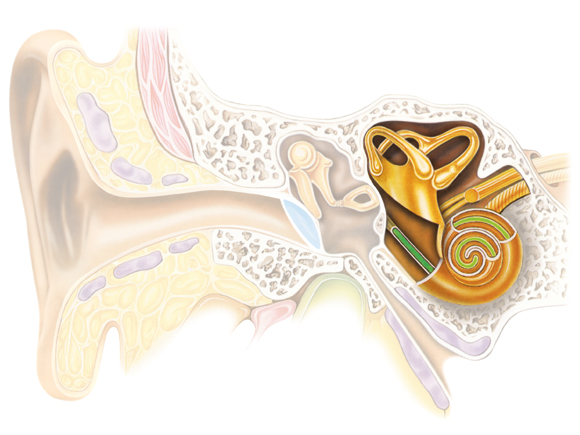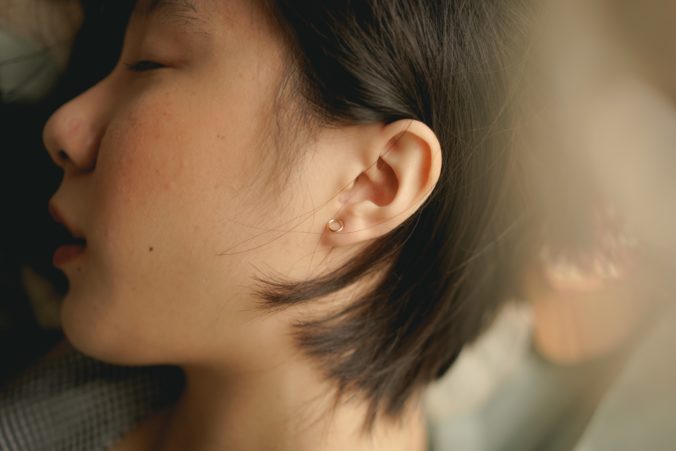Perceptive deafness, usually referred to as sensorineural hearing loss, is caused by malformations or damage to the inner ear or auditory nerve. We explain its causes and possible treatments in our article below.
What is sensorineural hearing loss?
Different types of hearing loss are identified by the physical location of the underlying issue. This post will focus on perceptive or sensorineural deafness, which is caused by injuries or disorders in the inner ear or auditory nerve.
These injuries in the inner ear affect its structure and main function–transmitting vibrations in the form of nerve impulses to the auditory nerve and brain–and therefore cause a loss of hearing. Perceptive deafness can affect one ear (unilateral) or both (bilateral).

A combination of conductive and sensorineural hearing loss due to damage or abnormalities in both the middle and inner ear is known as mixed deafness.
Causes and symptoms of sensorineural or perceptive deafness
Patients suffering perceptive deafness have difficulties distinguishing words against a noisy background.
If they are only deaf in one ear, it can be difficult for them to identify where sounds are coming from, and they can be distorted if presented to the patient’s deaf side. If, however, the patient has bilateral deafness, their hearing issues are not affected by background noise, and they will have trouble distinguishing words even when there is no other sound source around them.

Perceptive deafness can be caused by several issues in the inner ear, including infections or damage linked to the use of ototoxic drugs, strokes, an increase in blood pressure or tumours on the auditory nerve (acoustic neuroma). Perceptive or sensorineural hearing loss may also be congenital: another possible cause involves the patient’s neuronal structures, which can impede the transmission of sounds to the brain even when there is no damage to the auditory system itself. While the main causes of hearing loss that originates in the inner ear or auditory nerve are different, these cases have similar symptoms and effects.
Treating perceptive hearing loss
Treatment guidelines will depend on whether the damage or deformity is in one or both ears, and the severity of the hearing loss. However, hearing aids are the most common solution for people with slight to moderate hearing loss.
In cases of profound sensorineural hearing loss, patients are recommended to consider using cochlear implants. These implants simulate the natural hearing process with electric impulses that stimulate the auditory nerve.
Consult your medical or ENT specialist if you notice any changes in your hearing.
Do you suffer sensorineural hearing loss? Leave a comment here and share your experience with others in the same situation.

I’ve been having a hard time noticing when people talk to me, and I’m not sure what the deal is. It makes sense that it could be some kind of hearing loss! Maybe it would be a good idea for me to talk to a professional to get help with this. They would be able to make this a lot easier for me.
We recommend you visit the doctor to settle any doubts. Thanks for the comment Braden!
Thanks for sharing post on hearing loss and audiologist experience. It is better to see audiologist for hearing aids and hearing test.
Keep posting such a great knowledge on hearing aid cost as https://hearme.co.nz/ is serving in hamilton and auckland for better hearing services.
Thanks a lot for this information.
Thanks for your comment, Joe!
Wearing proper hearing protection consistently and correctly can protect from hearing loss.
Thanks for sharing useful information.!
I like this article so much, it has a lot of info I need to know, thanks for sharing this amazing info
Thanks for your comment. Best regards.
It really helped when you talked about perceptive hearing loss and its treatment options. Recently, my sister said something’s wrong with her hearing abilities. My sister was in an accident, and I think it might’ve affected her hearing, so I’ll be sure to help her get tested! Thanks for the information on how hearing loss could be managed with implants.
Thank you, Eli Richardson, for sharing your sister’s experience with us. Yes, the best she can do is get tested by an specialist.
I like this article. Very informative. Really helped me a lot.
Thank you so much, we really appreciate the feedback!
The signs and root causes of perceptive deafness are well laid out in your blog post. Perceptual deafness is discussed in terms of the processes involved, such as the involvement of sensory hair cells and the auditory system. Your post helps bring more attention to this form of hearing loss by illuminating its causes, which include genetics, noise, and certain medical problems.
Thanks for the contribution to this article!